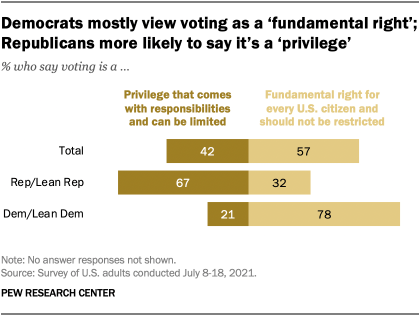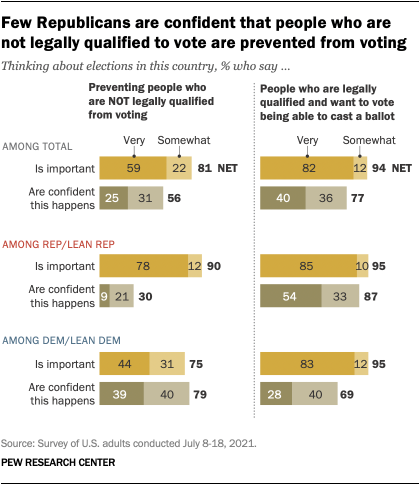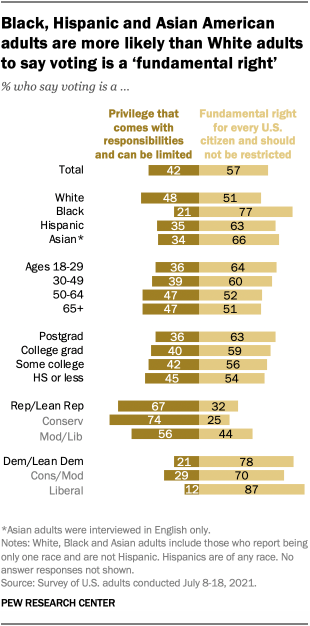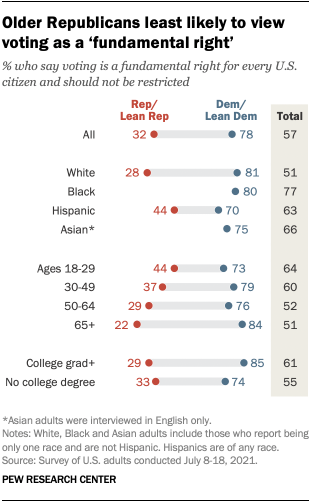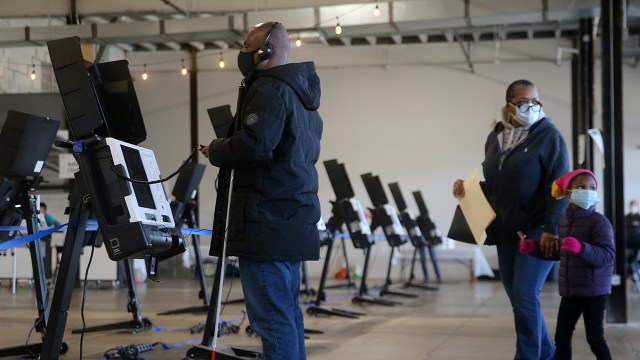
As political battles continue around the nation over voting access and restrictions, a new Pew Research Center survey finds that a majority of Americans (57%) say voting is “a fundamental right for every adult U.S. citizen and should not be restricted in any way.”
Fewer (42%) express the view that “voting is a privilege that comes with responsibilities and can be limited if adult U.S. citizens don’t meet some requirements.”
Democrats and Democratic-leaning independents overwhelmingly say voting is a fundamental right that should not be restricted in any way – 78% hold this view, while fewer than a quarter (21%) say it is a privilege. Two-thirds of Republicans and Republican leaners say voting is a privilege that can be limited if requirements are not met, compared with about half as many (32%) who say it is a fundamental right.
To assess Americans’ views about voting and the right to vote, we surveyed 10,221 U.S. adults July 8-18, 2021. Everyone who took part is a member of Pew Research Center’s American Trends Panel (ATP), an online survey panel that is recruited through national, random sampling of residential addresses. This way nearly all U.S. adults have a chance of selection. The survey is weighted to be representative of the U.S. adult population by gender, race, ethnicity, partisan affiliation, education and other categories. Read more about the ATP’s methodology.
Here are the questions used for the report, along with responses, and its methodology.
The survey, conducted July 8-18, 2021, also finds a rare point of partisan agreement when it comes to the importance of all qualified citizens being allowed to vote. However, there are sizable differences in confidence about whether this is happening – and even wider differences in confidence in whether people not legally qualified to vote are prevented from voting.
Nearly all Americans (94%) – including 95% of both Republicans and Democrats – say it is important that people who are legally qualified to vote are able to cast a ballot, with 82% saying it is very important.
A large majority of Republicans (87%) are at least somewhat confident that legally qualified people are able to vote if they want to, including 54% who are very confident this is the case. Democrats express less confidence: 69% say they are at least somewhat confident that legally qualified people are able to cast a ballot, and just 28% say they are very confident in this.
Most Americans (81%) also say it is at least somewhat important to prevent people who are not legally qualified to vote from doing so. While large majorities in both parties say this is at least somewhat important, Republicans are considerably more likely than Democrats to say it is very important to prevent this (78% vs. 44%). In contrast, Democrats are much more confident than Republicans that this happens: 79% say they are either very or somewhat confident it does, compared with just 30% of Republicans.
In a survey conducted last October, Democrats and Republicans were similarly divided over whether people who were not legally qualified to vote would be prevented from casting ballots in the then-upcoming 2020 presidential election.
Demographic differences in views of voting as a right or a privilege
Black Americans are more likely than those in other racial and ethnic groups to see voting as a fundamental right, while White Americans are the least likely to say this. About three-quarters of Black Americans (77%) say voting is a right for every U.S. citizen and should not be restricted, as do 63% of Hispanic Americans and 66% of Asian Americans. White Americans are about evenly divided: 51% say voting is a right, while 48% say it is a privilege.
Younger adults are more likely than older adults to say that voting is a fundamental right for U.S. adult citizens: 62% of Americans ages 18 to 49 say that voting is a fundamental right, while 52% of Americans 50 and older say this.
Those with higher levels of education are somewhat more likely than those with less education to take the view that voting is a right rather than a privilege.
While ideological divides within the two partisan groups are far more modest than the overall partisan differences, conservative Republicans are more likely than moderate and liberal Republicans to say that voting is a privilege that can be limited (74% vs. 56%). At the same time, liberal Democrats are more likely than conservative and moderate Democrats to say that voting is a fundamental right that should not be restricted (87% vs. 70%).
Within partisan groups, views about whether voting is a fundamental right vary with age, race and ethnicity, and education.
Although majorities of Republicans – across age groups – view voting as a privilege with responsibilities that can be limited, younger Republicans and GOP leaners are more likely than older Republicans to say that voting is a fundamental right for every U.S. adult citizen: 44% of Republicans and Republican leaners under 30 say it is a fundamental right, compared with 37% of those ages 30 to 49, 29% of those 50 to 64 and just 22% of those 65 and older.
By contrast, there are more modest age differences in these views among Democrats, with seven-in-ten or more across all age groups viewing voting as a fundamental right. However, Democrats ages 65 and older are somewhat more likely to say this than younger Democrats.
About eight-in-ten White (81%) and Black (80%) Democrats say that voting is a fundamental right, as do 75% of Asian American Democrats and 70% of Hispanic Democrats. Among Republicans, Hispanic Republicans are more likely than White Republicans (44% vs. 28%) to view voting as a fundamental right.
Among Democrats, those who have obtained a college degree (85%) are somewhat more likely than those who have not (74%) to view voting as a fundamental right. The reverse is true among Republicans: Those with a bachelor’s degree or more education are slightly less likely than Republicans without a college degree to say voting is a fundamental right (29% vs. 33%).
Note: Here are the questions used for the report, along with responses, and its methodology.
